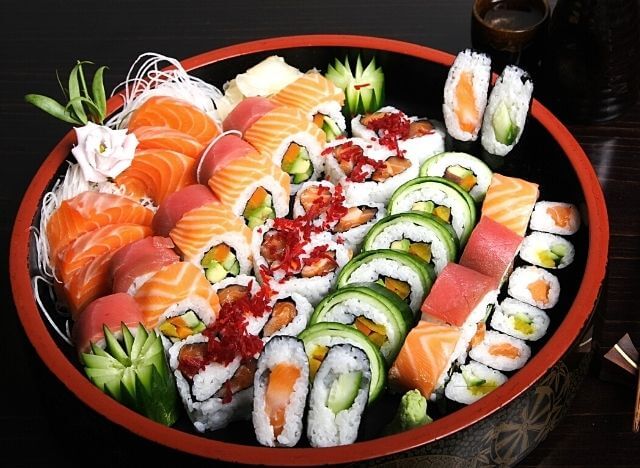Yes, you can freeze sushi. However, it depends on the type of sushi. Some types of sushi can be frozen like salmon sushi, avocado sushi, vegetarian sushi and California roll sushi.
Sushi is one of the traditional dishes in Japan with the main ingredient is rice being mixed with vinegar, seafood and seaweed. Even though sushi can be frozen, you should eat them as soon as possible because they will spoil easily.
If you throw away leftover sushi after dinner, it seems like you are a sinner. You want to put it in freezer to eat later. So, what are the best ways to freeze sushi? How long can you keep it in freezer? Let’s find the answer in this article.
Sushi 101 – What do you know about sushi?
The name “Sushi”
In Japanese, ‘su’ means vinegar and ‘shi’ comes from ‘meshi’, meaning rice. Therefore, ‘sushi’ can be translated as ‘vinegared rice’.
Traditional sushi is vinegared rice topped with other ingredients like raw seafood and seaweed while the modern sushi has variations which contain cooked seafood, veggies, or even meats.
Sushi vs Sashimi
Knowing the differences between sushi and sashimi will make you become more professional in ordering Japanese food.
Sashimi: In sashimi, there is no rice, no seasoning. It is just the thinly sliced pieces of raw seafood or fish. Sashimi is often served on a bed of daikon (sliced radishes) and paired with wasabi and soy sauce.
Sushi: As you already know, rice is the must-have ingredient in sushi. Sushi rice is a kind of short grain rice soaked with vinegar. This flavorful rice combines with fish, seafood, seaweed and vegetables to become a dish called sushi. There are many types of sushi.
Typical types of sushi
Here are some main types of sushi.
Nigiri
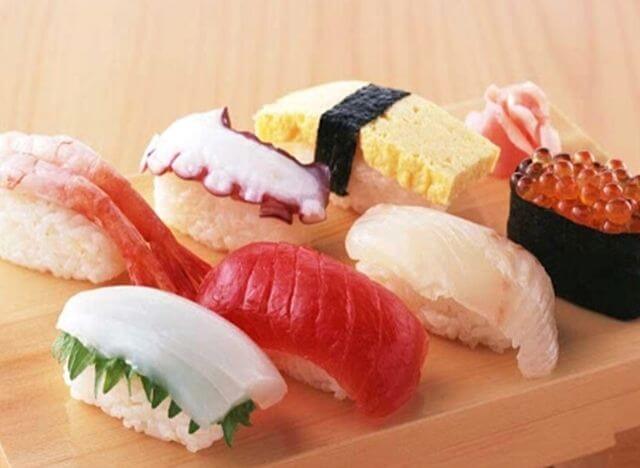
Nigiri sushiThis is the most traditional sushi, usually in oblong form. Simply, it consists of a single topping like vegetable, a slice of egg omelet, seafood or a slice of raw fish put over the rice.
Maki rolls
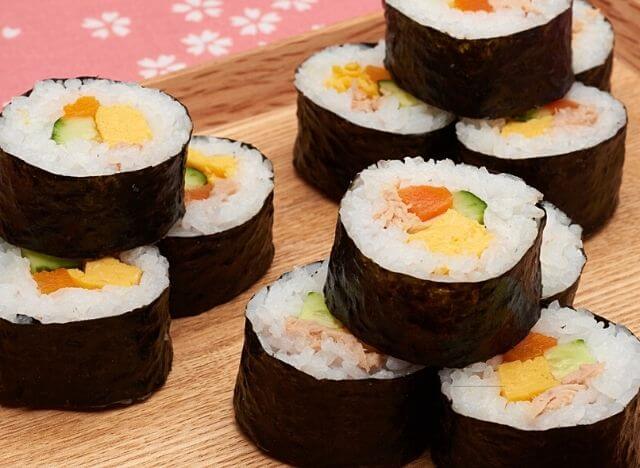
This is the most popular sushi in the world. The vinegared rice and other ingredients are wrapped around by seaweed sheets to make a long cylinder shape.
Chirashi

This sushi contains rice and mixed ingredients that put together in a bowl.
Uramaki
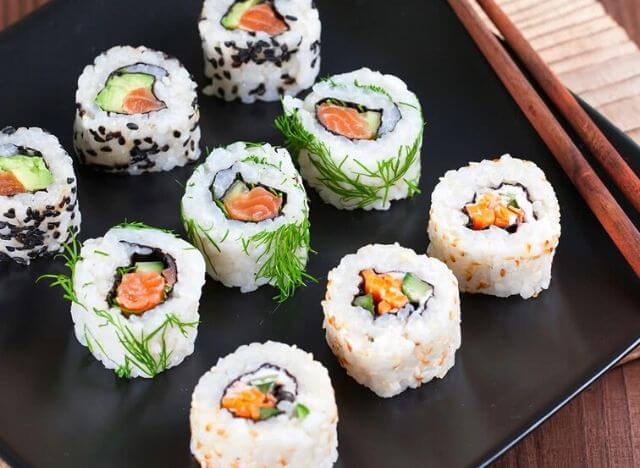
For this type of sushi, rice is on the outside while the seaweed wraps around the filling.
Temaki
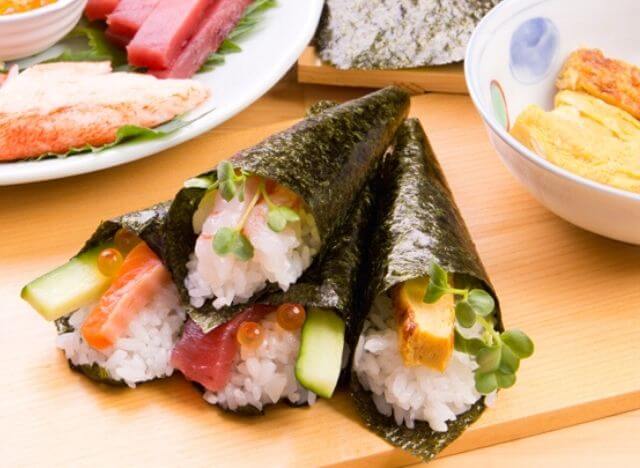
The sushi is a hand-rolled type and has a cone shape which looks like an ice cream.
How is sushi served?
Typically, sushi is often eaten by dipping it in a Japanese soy sauce, called ‘shoyu” mixed with wasabi (a spicy green paste) and gari (picked ginger).
Sushi calories and nutritional information
Depending on each type of sushi, the calories and nutritional values may vary. Normally, the calories containing in sushi rolls can range from 200 to 500 calories. A piece of Nigiri may provide between 40 to 60 calories.
Here is the nutritional information in 100 grams (2 or 3 pieces) of some common sushi:
| Types of sushi | Calories | Protein | Carbs | Fat | Sodium |
| Avocado roll | 140 | 2 grams | 24.8 grams | 3.7 grams | 483 mg |
| California roll | 93 | 2.9 grams | 18.4 grams | 0.7 grams | 428 mg |
| Salmon roll | 190 | 6 grams | 24 grams | 6 grams | 330 mg |
| Tuna roll | 175 | 7.5 grams | 16.7 grams | 7.5 grams | 217 mg |
| Shrimp tempura roll | 175 | 3.7 grams | 28 grams | 5.9 grams | 421 mg |
Is sushi good for your healthy?
Sushi is considered a healthy dish because it has not only rice but also other nutritious ingredients such as fish, seaweed, ginger and wasabi that are beneficial to your health.
The raw fish in fresh sushi has many nutrients, but it also contains many harmful parasites, bacteria such as salmonella bacteria, vibrio bacteria, or diphyllobothrium parasites. Therefore, there is a regulation by the Food and Drug Administration (FDA) that certain fish such as salmon need to be frozen to kill parasites before serving raw.
Healthy sushi: Salmon sushi, Avocado sushi, Vegetarian sushi, California-style sushi roll.
Unhealthy sushi: Sushi Philadelphia, Swordfish sushi, Tuna sushi.
Even though, sushi is a delicious dish containing vitamins, minerals, and several healthful substances, basically sushi is high in carbohydrates, salt and unhealthy fats. Therefore, you should not eat too much sushi, including good and unhealthy sushi, to avoid the potential risk to your health in the long term.
Can you use frozen fish for sushi?
Yes, you can use frozen fish for sushi. According to experts, frozen fish is 95% better than the fresh fish available in the market because fresh fish undergoes diverse temperature and handling conditions. Therefore, the best sushi bars use frozen fish to achieve the highest quality.
How to freeze sushi correctly?
For homemade sushi
If you’re making sushi at home and see that there are too many ingredients, so you decide to save them in freezer for later use. In this case, you should assemble the individual ingredients of sushi such as rice, seafood, algae or seaweed, salmon or other fish. Then, freeze each of them separately.
Or if you want to prepare all the ingredients first and freeze them for making sushi later. Here is what to do.
How to freeze rice in sushi
- After the rice is cooked, you should immediately put the rice in the container, close the lid, while the rice is still hot. The lunch box should be a vented type that can be used in the microwave.
- Once the lunch box has cooled down, you can freeze it right away.
- If you’re not using a microwave-safe container, you can wrap the rice in oven-safe plastic wrap.
- Make a note of the cooking date and store it in the freezer.
Steps to freeze avocado
Here’s how to freeze avocado:
- Cut avocado into slices
- Squeeze a little lemon juice over the avocado slices to prevent them from turning brown
- Put in a food storage box or vacuum bag
- Label the bag and put it in the freezer
How to freeze salmon and other fish
Use salt dissolved in water to add 2 tablespoons of fresh lemon juice and then use this solution to wash the surface of the fish. Or you can use white rice wine mixed with crushed fresh ginger to marinate fish to remove the fishy smell.
- Cut the salmon into the portion
- Wash the fish with water carefully
- Use a dry paper towel to absorb all the water on the surface
- Put the fish in a food container or vacuum bag
- Label it and put it in the freezer
Steps to freeze seaweed
Freezing seaweed is as follows:
- Put the seaweed in a vacuum bag or food container
- Label the container and put it in the freezer
For the leftover sushi: How to freeze it?
You should put your sushi in freezer as soon as possible as it will get contaminated if stay in room temperature for too long.
Follow the steps:
- Wrap each piece of sushi with small sheets of plastic wrap or parchment paper
- Put the sushi in the storage box or bag
- Label the processing date and put it in the freezer, so you know when the best time is to use your sushi
How long can sushi last in the freezer?
Technically, you can freeze sushi, but how long it stays safe in freezer depends greatly on the ingredients in the sushi.
If you freeze the fish separately before making sushi, it can be good in freezer for 2 to 3 months to ensure nutritional value, taste and visual appeal. It is best to keep the following ingredients in a separate box to preserve it longer.
- Rice: up to 1 month
- Avocado: 4 to 6 months
- Seaweed: 6 to 12 months
- Algae: only suitable for refrigeration, not in the freezer
If you put the rolled sushi in freezer, it can only be safe for 4 to 5 days at most.
How to defrost sushi in the right way?
For the fish
Just remove the plastic wrap and place the fish on a plate, cover it and place it inside the fridge for 24 hours at 3 degrees Celsius.
If you’re in a hurry, soak the fish in cool water for at least 30 minutes to an hour. However, you should not thaw the salmon at room temperature.
Other ingredients
If you want to defrost avocado, seaweed, and rice, you can soak both the avocado bag, seaweed bag, and frozen rice bag in warm water for about 2 hours.
Defrosting avocado with warm water instead of cold water will help the avocado retain its aromatic fat and not become mushy or watery.
You may also like: Can You Freeze Tuna?
Frequently asked questions
How to know if your sushi is spoiled?
If you see that sushi has a pungent and foul smell, but not a fishy smell, they may become spoiled. Also, if the fish in the sushi is green, brown, or a thick liquid comes out, the fish is for good for eating.
Is frozen sushi as safe as fresh?
Frozen sushi rolled with many ingredients is perfectly safe for 4 to 5 days. The low temperature of the freezer at -31 degrees F ensures that the parasites in the fish are destroyed.
Can you use salmon for sushi?
Yes, you can completely use salmon for sushi. In fact, salmon sushi is one of the safe types of sushi, not like Philadelphia sushi, marlin sushi, swordfish sushi, shark sushi bringing high levels of mercury, especially affecting children, nursing mothers or pregnant women.
How to keep sushi fresh overnight?
After making sushi, put it in the refrigerator until early in the morning, leave it for about 30 minutes before eating.
You should use foil to wrap the sushi plate to keep it fresher. And this is the same way to preserve fish as ingredients for fresh and safe sushi.
Final thoughts
Sushi is a delicious Japanese dish which can be served as main course or appetizer. You can make it at home, dine out in restaurants, or buy at stores.
Hope this article helped you know how to freeze sushi and also learned the secret to freezing and using frozen sushi safely at home. Thank you for reading!
Reference
1. Can You Freeze Sushi- Cooking guide, John Bird, Jun 12, 2021
2. Easy Guide to Freeze Sushi,
3. What Exactly Is Sushi?, Dec 3, 2009

